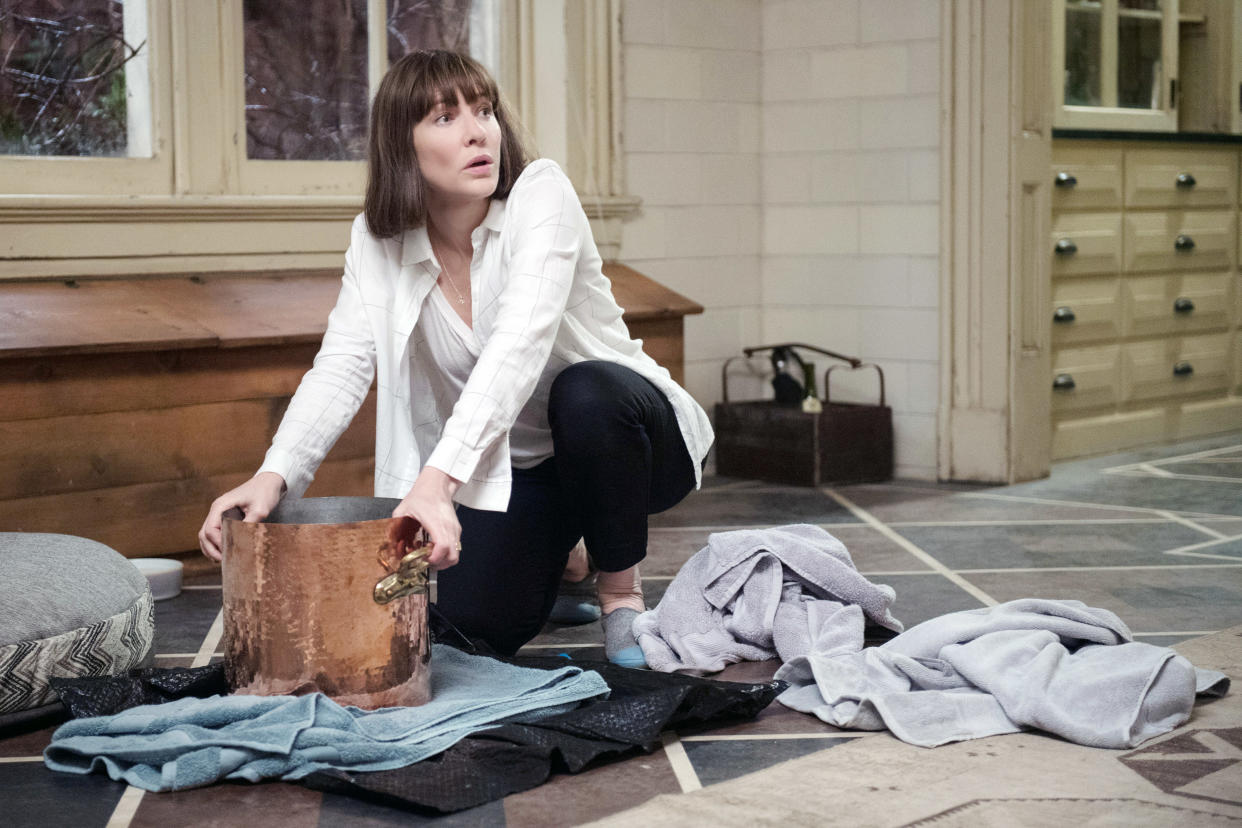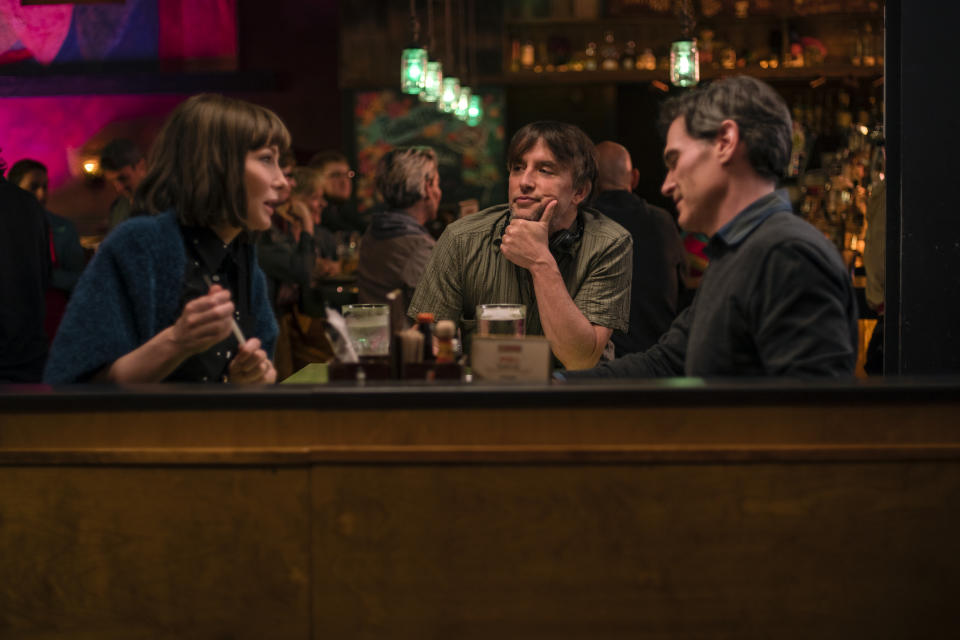How Cate Blanchett and Richard Linklater came up with most shocking moment in 'Where'd You Go, Bernadette'

Warning: This post contains spoilers for Where’d You Go, Bernadette.
There’s a double meaning to the title Where’d You Go, Bernadette, Richard Linklater’s film adaptation of Maria Semple’s 2012 bestselling epistolary novel. On the one hand, it’s a reference to the disappearing act that the title character, reclusive architect Bernadette Fox (played by Cate Blanchett), pulls midway through the narrative. But even before that happens, the people in her life — particularly her husband, Elgin (Billy Crudup) — are already concerned that she’s drifted away from them, vanishing down the corridors of her own mind. Even though Bernadette repeatedly insists that she’s fine, her behavior suggests to others that she’s anything but.
The vast gap between how Bernadette views herself and how the rest of the world perceives her sets up an inevitable clash, and that comes towards the end of the movie’s second act, when Elgin organizes an intervention designed to get his wife to accept his idea that she’s in need of professional psychiatric help. To say it goes badly is an understatement: Confronted by a room filled with hostile — or, at least, highly skeptical — faces, Bernadette flees the scene. “It’s the moment where everything changes; a real fork in the road kind of thing,” Blanchett tells Yahoo Entertainment. “The positioning of where the intervention happens and how much the other characters and the audience knows about Bernadette before and after is very massive. It was a real challenge.”
In separate interviews with Blanchett and Linklater, we explored how that challenging scene leapt off of the page and onto the screen, and how it speaks to the movie’s larger themes of women taking control of their own destinies, no matter how peculiar it might seem to others.

Richard Linklater: I describe that scene as kind of a sad collision of differing viewpoints. Bernadette is on the right path to some degree, she’s had some revelations. Meanwhile, Elgin is kind of desperate and has outsourced his family’s health to an industry that gets paid to take decisive action in interventions. So it’s a sad confluence of events. It's kind of your worst nightmare. You're living your life and then you look up and all your friends and family have a laundry list of everything you've done that's a little off or quirky, and they've built a case against you that you are insane. I think I live in fear of this!
Cate Blanchett: As much as it's about Bernadette, and the state that she’s in, it’s also really the moment when her husband — who has been completely ignoring the state that his wife is in — shows he’s in denial himself. He’s refusing to acknowledge or see Bernadette's point of view. So it's a moment when they realize how estranged they are from one another, and it's about his own self deception as much as hers.
Linklater: Everyone else in the room has already made up their minds; they've reached their conclusion. They're just going through the motions of it, which is I guess what you have to do when you're making a definitive move. But it's sad to not be listening to her at that crucial moment. But that also shows where she and Elgin are actually at: They're not hearing each other at this stage of their relationship. He's worried about her, and doesn't know what to do and it takes the rest of the movie for him to realize the error of his ways. I tried to have some sympathy for Elgin, and not make him a total bad guy. But what he's doing there is still the wrong thing. If you make up your mind and don’t listen to new information, bad things can happen.

Blanchett: We played it many, many different ways. It was like a theater rehearsal process in a way. For me, it was about calibrating my performance to what the other actors were doing. I don't think it's in the movie, but there was a previous scene where [the psychiatrist] had gone to Elgin’s office, but then Richard decided that that maybe wouldn't be in the movie, so Billy had to sort of recalibrate his character’s understanding of what was going on in the scene. Rick also has a particularly laconic sense of humor, which operates sort of a slightly different frequency to the book’s sense of humor. So it was a matter for me as an actor trying to exist in the space between those two perspectives.
Linklater: Cate's very intuitive, and wants to just feel her way through a scene, just like Bernadette talks about. But she kinda just had to get thrown in there and be Bernadette. But I was so blessed to have the front row seat to Cate Blanchett making choices. In rehearsals, I'd just see her read something and I’d go, "Oh!” There are very few people in the world who could do what she just did, and she did it so suddenly and effortlessly. When you're the coach of the superstar player, you just sit there and go, "Wow, yeah. We’ll build a team around that.”
Blanchett: In the book, you never get Bernadette speaking directly to Elgin, because of the epistolary structure. You get the reported version of their domesticity. So when you see it in film, when you see her in the context of that rattling around that old house, you say, "This is a woman who is really isolated,” and the audience goes, “This is maybe part of the problem.” But by the time the intervention happens, I think the audience has hopefully seen that she is not insane. She's just got a few personal problem, which is very different from needing to be committed to a mental institution.

Linklater: I love the movie, Alice Doesn’t Live Here Anymore, and it does have some similar things to this film in that Ellen Burstyn’s character goes on a journey to find herself. I didn’t think of it too specifically, but it does loom large as a portrait of a great woman and mother finding herself. My mom is in that category, too. I depicted that in Boyhood: She had kids early and then found herself in the process. The thing now is to establish your career and front load all that stuff and then have kids and be responsible. But her generation didn’t really have that benefit.
Blanchett: I have never met a woman who hasn't loved the book. They’ve told me: "Oh, I loved it. Bernadette’s such a crazy, relentless, mad agoraphobic!” But I read it and went, "I didn't think she's agoraphobic!” I thought she was someone who was just really hidden from themselves and surfing a whole lot of grief and kind of self-loathing. And she doesn’t have the social graces to try and even pretend. Oftentimes, the first thing we have to do in the morning is put on the happy face, and Bernadette hasn't got that in her DNA.
Where’d You Go, Bernadette is playing in theaters now. Visit Fandango for showtime and ticket information.
Read more from Yahoo Entertainment:
Want daily pop culture news delivered to your inbox? Sign up here for Yahoo Entertainment & Lifestyle’s newsletter.



